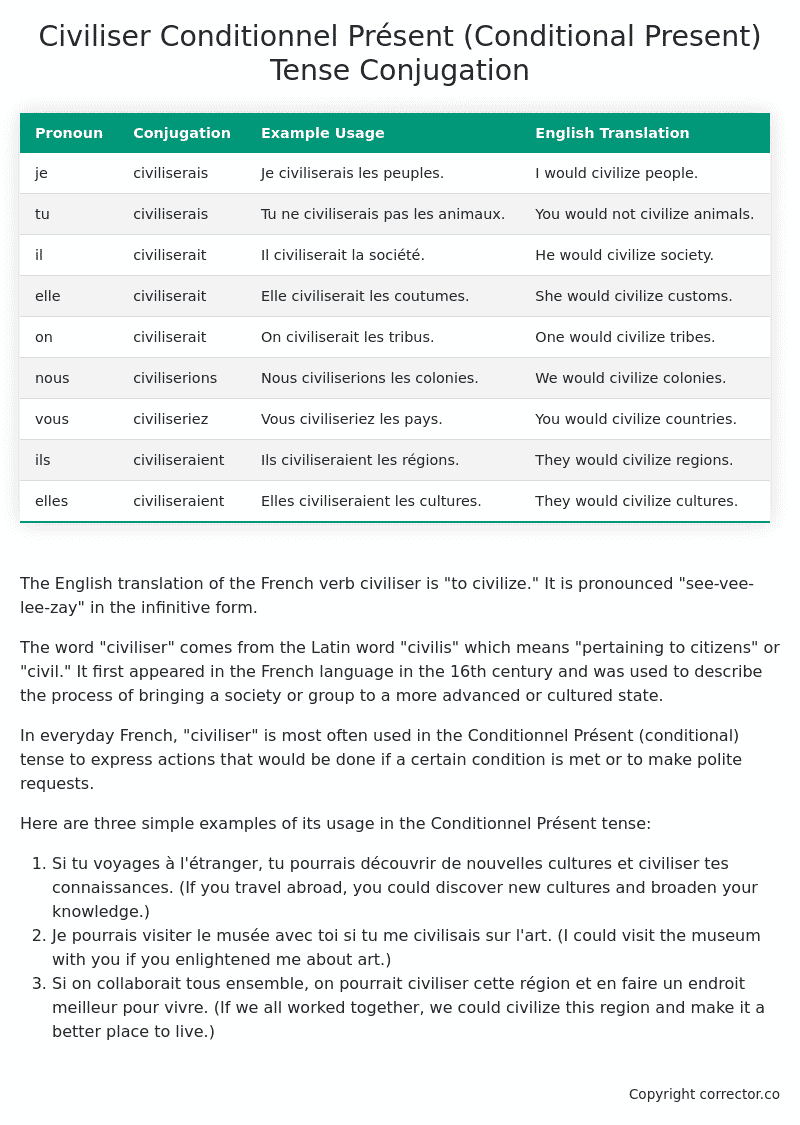Conditionnel Présent (Conditional Present) Tense Conjugation of the French Verb civiliser
Introduction to the verb civiliser
The English translation of the French verb civiliser is “to civilize.” It is pronounced “see-vee-lee-zay” in the infinitive form.
The word “civiliser” comes from the Latin word “civilis” which means “pertaining to citizens” or “civil.” It first appeared in the French language in the 16th century and was used to describe the process of bringing a society or group to a more advanced or cultured state.
In everyday French, “civiliser” is most often used in the Conditionnel Présent (conditional) tense to express actions that would be done if a certain condition is met or to make polite requests.
Here are three simple examples of its usage in the Conditionnel Présent tense:
- Si tu voyages à l’étranger, tu pourrais découvrir de nouvelles cultures et civiliser tes connaissances. (If you travel abroad, you could discover new cultures and broaden your knowledge.)
- Je pourrais visiter le musée avec toi si tu me civilisais sur l’art. (I could visit the museum with you if you enlightened me about art.)
- Si on collaborait tous ensemble, on pourrait civiliser cette région et en faire un endroit meilleur pour vivre. (If we all worked together, we could civilize this region and make it a better place to live.)
Table of the Conditionnel Présent (Conditional Present) Tense Conjugation of civiliser
| Pronoun | Conjugation | Example Usage | English Translation |
|---|---|---|---|
| je | civiliserais | Je civiliserais les peuples. | I would civilize people. |
| tu | civiliserais | Tu ne civiliserais pas les animaux. | You would not civilize animals. |
| il | civiliserait | Il civiliserait la société. | He would civilize society. |
| elle | civiliserait | Elle civiliserait les coutumes. | She would civilize customs. |
| on | civiliserait | On civiliserait les tribus. | One would civilize tribes. |
| nous | civiliserions | Nous civiliserions les colonies. | We would civilize colonies. |
| vous | civiliseriez | Vous civiliseriez les pays. | You would civilize countries. |
| ils | civiliseraient | Ils civiliseraient les régions. | They would civilize regions. |
| elles | civiliseraient | Elles civiliseraient les cultures. | They would civilize cultures. |
Other Conjugations for Civiliser.
Le Present (Present Tense) Conjugation of the French Verb civiliser
Imparfait (Imperfect) Tense Conjugation of the French Verb civiliser
Passé Simple (Simple Past) Tense Conjugation of the French Verb civiliser
Passé Composé (Present Perfect) Tense Conjugation of the French Verb civiliser
Futur Simple (Simple Future) Tense Conjugation of the French Verb civiliser
Futur Proche (Near Future) Tense Conjugation of the French Verb civiliser
Plus-que-parfait (Pluperfect) Tense Conjugation of the French Verb civiliser
Passé Antérieur (Past Anterior) Tense Conjugation of the French Verb civiliser
Futur Antérieur (Future Anterior) Tense Conjugation of the French Verb civiliser
Subjonctif Présent (Subjunctive Present) Tense Conjugation of the French Verb civiliser
Subjonctif Passé (Subjunctive Past) Tense Conjugation of the French Verb civiliser
Subjonctif Imparfait (Subjunctive Imperfect) Tense Conjugation of the French Verb civiliser
Subjonctif Plus-que-parfait (Subjunctive Pluperfect) Tense Conjugation of the French Verb civiliser
Conditionnel Présent (Conditional Present) Tense Conjugation of the French Verb civiliser (this article)
Conditionnel Passé (Conditional Past) Tense Conjugation of the French Verb civiliser
L’impératif Présent (Imperative Present) Tense Conjugation of the French Verb civiliser
L’infinitif Présent (Infinitive Present) Tense Conjugation of the French Verb civiliser
Struggling with French verbs or the language in general? Why not use our free French Grammar Checker – no registration required!
Get a FREE Download Study Sheet of this Conjugation 🔥
Simply right click the image below, click “save image” and get your free reference for the civiliser Conditionnel Présent tense conjugation!

Civiliser – About the French Conditionnel Présent (Conditional Present) Tense
Formation
Common Everyday Usage Patterns
Expressing Polite Requests
Expressing Hypothetical Situations
Expressing Doubt or Uncertainty
Interactions with Other Tenses
Present Tense
Past Tense
Future Tense
Conditional Perfect
Summary
Want More?
I hope you enjoyed this article on the verb civiliser. Still in a learning mood? Check out another TOTALLY random French verb conjugation!


